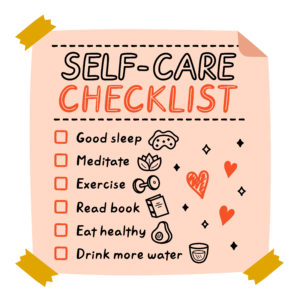Contrary to popular belief, self-care is about so much more than “treating yourself” and while “self” is in the title, it isn’t selfish.
After all, “Self-care is neither optional or glamorous. Self-care is an ethical obligation, for one cannot serve others from an empty vessel,” says Deborah Horowitz, Therapist Training Manager at Valera Health.
That’s where therapeutic self-care comes in.

What is Therapeutic Self-Care?
Therapeutic self-care is an approach to self-care rooted in overall wellbeing. This can include areas such as physical self-care, social self-care, mental self-care, emotional self-care and spiritual self-care, environmental self-care and financial self-care.
Vilma Vendrell, LCSW, MPA and Clinical Supervisor at Valera Health, defines self-care as “…the process of taking care of oneself with behaviors that promote health and active management of illness when it occurs.”
When it comes to our mental health, engaging in self-care activities can help increase distress tolerance, increase concentration, help manage stress, reduce risk of illness and improve our overall quality of life.
“Self-care should not be a reactive plan but rather one that is incorporated in everyday life to help promote an overall healthy lifestyle,” advises Vendrell. “Self-care is important in maintaining healthy relationships with yourself and with others.”
Self-care also includes the management of mental illnesses as well as management of anxiety and depression symptoms. Self-care doesn’t have to be done alone, and can include self-care interventions by health providers through things like medication management, therapy and community support, which Valera Health offers through its providers and various group therapy programs.
According to the World Health Organization (WHO), supporting self-care interventions has the potential to:
- Strengthen national institutions to maximize efficient use of domestic resources for health
- Create health sector innovations, including by catalyzing digital and health approaches
- Improve access to medicines and interventions through optimal interfacing between health systems and sites of health care delivery

Ways to Practice Therapeutic Self-Care
1. Schedule Some “Me” Time
It’s important to take time out of each day to turn the focus inward and reconnect with yourself.
Here are a few ideas on how to do this:
- Enjoy a morning cup of coffee (or tea) distraction-free before you start work, or before your babies (or fur babies) wake up. Rather than chugging your morning caffeine supply, drink it slowly, taking time to enjoy each sip.
- Start a gratitude or open-ended journal and take a few minutes each day to write down how you’re feeling.
- Block off a half-hour to an hour of time to watch your favorite show.
Moving around doesn’t necessarily have to be laborious or require an intense sweat. Set timers and other reminders to get up and move to another part of the house besides the bathroom. Walk to the mailbox, around the block, do a few jumping jacks, or any other favorite physical activity.
When it comes to work and productivity, it’s important to recognize your boundaries and enforce them. Focus on trying to separate work and home, even if you work from home. Have visual reminders for yourself and others that you are working and will address the home stuff after work. Change your workspace to make it homey but different from your home decor. Change work spaces from time to time, if possible (such as working in a coffee shop instead of at home for the day).

Final Thoughts
Self-care can take many forms and finding the right self-care routine can look different from person to person. While developing a solid self-care routine can sometimes feel overwhelming, it is so worth it in the end. When you choose to take care of yourself, you make the conscious decision to develop healthy skills that can lead to long-term benefits.
If you’re having trouble coming up with and practicing a self-care routine, therapists and other healthcare providers can be a great resource. Valera Health offers many different affordable telemental health programs led by mental healthcare specialists. Request a free consultation with one of our health connectors to learn more, or visit valerahealth.com.